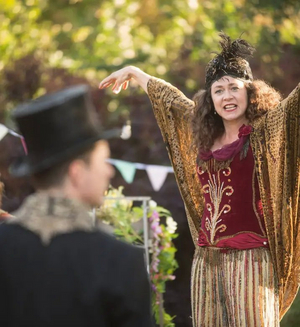Guest Blog: Sioned Jones On Her New Production of THE TEMPEST And The Art Of 'Doubling'
Multiple roles and gender equality in the fifth anniversary production of Shakespeare In The Squares

On the fringe there is a long tradition of 'doubling'. That is actors being cast to play more than one role in a production. Often it begins as an economic imperative; for a smaller company the budget demands it, but imaginative doubling can also add delicious, non-textual layers to a production.
During rehearsals it keeps company members far more fully engaged, giving them plenty to focus on and less tedious waits in the dressing room during longer runs. Most actors relish being given contrasting roles to get their teeth into and opportunities to showcase their versatility as performers.
Audiences delight in seeing the same actor return to the stage during a production as a completely different character. And in a comedy, if that is highlighted by the clock of a 'quick change', it can also add shades of farce to a production, with the audience admiring the alacrity with which an actor has to transform before they can return to the stage.
It is not a device that necessarily works for every play. While Stanislavski loved how an actor could transubstantiate into different characters, I would say it is more of a Brechtian device: the actor represents the character.
Watching an actor play multiple roles actively reminds us of the meta-level of play. It lets us enjoy the story whilst simultaneously reminding us it's not 'real' because that actor cannot possibly be both characters at once, but we can admire their skill and virtuosity in inhabiting different shapes, energies, tones and accents convincingly.
Doublings can also reveal much about relationships, story and structure of the piece. In our production of The Tempest, the roles of Caliban and Ferdinand are paired. There is something deeply satisfying about seeing the same actor who is repeatedly called 'monster' also becoming the 'noble' hero of the piece.
It makes the difference between the characters, more about their behaviour than their appearance. The insults and observations of the other characters around them become less reliable, they are revealed as prejudiced or biased by their experience - just as we are in life - and the audience has to work harder to reach their own conclusions.
Shakespeare in the Squares has a commitment to equality, so we have transformed the gender of three characters. Alonzo's trusted counsellor is now Gonzala, doubled with the Goddess Juno. This made for a discovery of beautiful echoes between Gonzala's famous 'Commonwealth' speech "all foison, all abundance" and the Goddess' blessing, "all foison, all plenty" on the lovers in the betrothal masque. Ariel darts about the shipwreck with such a specific nautical vocabulary it cried out for her to be the Boatswain, "Is't not well done?".
Sebastian, King Alonzo's brother, has become his scheming sister, Sebastia, who, plotting with Antonio, creates an exciting power couple on the make dynamic (The Macbeths revisited). The casting of Sebastia is doubled with Phyllis Diller inspired Zany, Trincula.
Similarly, the actor playing Antonio also plays drunken Butler, Stephano. Where Antonio and Sebastia scheme to kill King Alonzo, Caliban encourages Stephano and Trincula to kill Prospero. What we learn from this doubling is the epic drama of the high status characters is essentially mirrored in the shenanigans of the clowns and to drive it home, they are played by the same people.
If part of the experience of theatre is for us "to hold, as T'were, the mirror up to nature", perhaps what doubling adds is that we are never only one thing: This particular mirror shows us multiple facets of ourselves in those natures.
Shakespeare In The Squares runs at various London venues from 15 June to 8 July.
Comments

Videos

